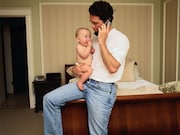Home » Health News »
New Dads Can Get the Baby Blues, Too

THURSDAY, Aug. 9, 2018 — Postpartum depression isn’t limited to moms.
Rates of depression among new fathers are similar to those among new mothers, and more needs to be done to help these men, two psychologists say.
“Recent research has shown that roughly 10 percent of new dads experience postpartum depression, and up to 18 percent have some type of anxiety disorder,” said Dan Singley, of the Center for Men’s Excellence in San Diego.
“Unfortunately, few psychologists receive focused training regarding identifying, assessing or treating common men’s issues in the period from conception to a year or so post-childbirth,” Singley said in a news release from the American Psychological Association.
Men tend not to seek mental health services during this period, so there’s a lack of scholarly attention to this vulnerable group, Singley added.
Singley’s work on male postpartum depression was scheduled for presentation Thursday at the annual meeting of the American Psychological Association, in San Francisco.
Sara Rosenquist is also addressing dads’ postpartum depression at the meeting at the same time.
“The predominant narrative has attributed these experiences to hormonal changes and fluctuations specifically related to pregnancy and birthing,” said Rosenquist, of the Center for Sexual and Reproductive Health Psychology in Cary, N.C.
“It is highly unlikely that the hormonal disruptions of pregnancy and birthing would explain the whole picture if fathers and adoptive parents all experience postpartum depression at the same rates,” added Rosenquist.
Factors that could trigger anxiety and the “baby blues” in new fathers include sleep deprivation, exhaustion, time away from work, gender role conflict and concerns about being a good parent, the psychologists said.
New and expectant fathers should be screened for signs of depression, Rosenquist and Singley believe.
However, identifying depression in men can be a challenge because they can have different symptoms than women, Rosenquist said.
“Women are more likely to report feelings of sadness and frequent crying, whereas men are more likely to feel irritable and socially disconnected,” she said.
One thing that can help men avoid postpartum depression is support from friends, Singley said.
“Fathers who maintain solid social support networks experience a buffer from the conflicts and demands associated with parenting,” he said.
More information
The U.S. National Institute of Mental Health has more on postpartum depression.
Posted: August 2018
Source: Read Full Article



